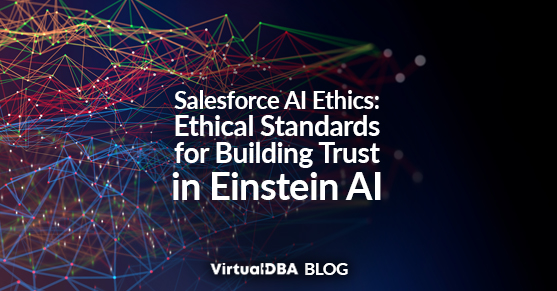As AI continues to transform the technological landscape, Salesforce AI ethics are essential for the responsible and transparent use of Einstein AI. Salesforce, a global leader in customer relationship management (CRM) solutions, has taken significant strides to ensure that its AI offerings, particularly Einstein AI, adhere to the highest ethical standards. This commitment concerns compliance and fostering trust, transparency, and responsibility in AI deployment.
When using Salesforce Einstein AI, several ethical aspects must be considered to ensure responsible and fair use.
- Bias and Fairness: Ensure the AI models are trained on diverse and representative data to avoid biases that could lead to unfair treatment of certain groups.
- Transparency: Be clear about how AI makes decisions and explain its outputs to build user trust.
- Privacy: Protect user data and ensure compliance with data protection regulations to maintain user confidentiality and trust.
- Accountability: Establish clear lines of responsibility for AI decisions and have mechanisms to address any issues or errors.
- Security: Implement robust security measures to protect AI systems from unauthorized access and potential misuse.
- Human Oversight: Maintain human oversight to review and validate AI decisions, especially in critical applications.
The Foundation of Trust
The principle of trust is at the core of Salesforce’s ethical approach to AI. Trust is Salesforce’s number one value, extending to all its AI products, including Einstein AI. To build and maintain this trust, Salesforce has established a comprehensive framework that guides the development and use of AI technologies.
The Office of Ethical and Humane Use of Technology
Salesforce has created the Office of Ethical and Humane Use of Technology to oversee the ethical implications of its technology. This office ensures that all AI products are developed and used ethically, humanely, and beneficially. The office collaborates with various teams across Salesforce to integrate ethical considerations into every AI development and deployment stage.
Guiding Principles for Ethical AI
Salesforce’s ethical standards for Einstein AI are built on five fundamental principles:
- Accuracy: It is crucial to ensure that AI models provide accurate and reliable outputs, backing up model responses with explanations and sources whenever possible. This transparency enables users to comprehend how decisions are made, and fosters trust in the AI’s recommendations.
- Safety: Salesforce employs industry-leading techniques to detect and mitigate bias, toxicity, and harmful responses in its AI models. This proactive approach helps prevent the spread of dangerous or biased content, ensuring that AI outputs remain safe and respectful.
- Honesty: Transparency is a cornerstone of Salesforce’s AI ethics. The company ensures that its models respect data provenance and are grounded in accurate data. This honesty includes indicating when users are interacting with AI instead of humans.
- Empowerment: AI should augment human capabilities, not replace them. Salesforce designs its AI tools to empower users, making them more efficient and effective in their roles. This principle guarantees that AI functions as a tool for augmentation, not a replacement for human judgment.
- Sustainability: Salesforce is committed to building AI models that are not only accurate but also environmentally sustainable. This entails developing appropriately sized models focusing on efficiency and minimizing the carbon footprint linked to AI development and deployment.
- Responsible AI in Practice: Salesforce’s commitment to ethical AI is not just theoretical; it is embedded in practical tools and policies. For instance, the AI Acceptable Use Policy provides clear guidelines for using AI responsibly. This policy includes measures to prevent the use of AI for automated legal decision-making and ensures that users are always notified when interacting with a bot.
Additionally, Salesforce has developed tools like Einstein Model Cards, which provide critical information about model inputs, outputs, and the conditions under which models work best. These cards also emphasize ethical considerations, aiding users in comprehending AI models’ limitations and potential biases.
Collaboration and Continuous Improvement
Salesforce recognizes that the ethical landscape of AI is constantly evolving. The company collaborates with external experts, industry partners, and its Research & Insights team to stay ahead of emerging challenges. This collaborative approach ensures that Salesforce’s AI ethics framework is continually refreshed and enhanced, incorporating the latest research and best practices.
Conclusion
Salesforce’s ethical standards for Einstein AI reflect a deep commitment to building trustworthy, transparent, and responsible technology. By adhering to accuracy, safety, honesty, empowerment, and sustainability principles, Salesforce ensures its AI products meet the highest ethical standards and contribute positively to society. As AI continues to transform industries and lives, Salesforce’s approach serves as a model for navigating the complex ethical landscape of modern technology.
XTIVIA’s Salesforce Managed Services
XTIVIA and Salesforce have many more features, including the latest technological innovations to help you and your teams enhance customer relationships and productivity. Salesforce stands out as the premier CRM solution available today. So, let XTIVIA show you the way!
Our certified Salesforce experts are available to assist you. Consider XTIVIA your trusted guide during your Salesforce implementation, and remember to inquire about our Salesforce Admin On-Demand service. Give us a call today!

